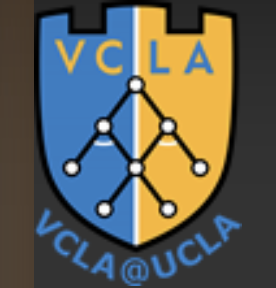UCLA Computer Science Research Labs
Network & Embedded Systems Laboratory

This laboratory, led by Dr. Mani Srivastava, conducts research "in the broad area of embedded and cyber-physical systems for applications in IoT, ubiquitous and mobile computing, and pervasive sensing and control.” The Network & Embedded Systems Laboratory is a multi-disciplinary lab as it conducts research in the Electrical & Computer Engineering Department and the Computer Science Department. The main interests are in problems related to "making these systems learning-enabled, secure, privacy-aware, human-coupled, wirelessly-networked, and energy-efficient." The Network & Embedded Systems Laboratory uses a full-stack approach in their research, as all forms of software and hardware are worked on.

The Center for Vision, Cognition, Learning, and Autonomy Research Group at UCLA affiliates with both the Computer Science and the Statistics Departments. Right now, the group focuses on researching computer vision. However, the group has previously conducted studies in automation, communications, language, social sciences, and artificial intelligence. VCLA's objective is to "pursue a unified framework for representation, learning, inference and reasoning, and to build intelligent computer systems for real world applications.”

Led by Dr. Songwu Lu, the Wireless Networking Group aims to "build high-performance and dependable networking solutions for the wireless Internet.” WiNG at UCLA focuses on six main areas of wireless networking: Mobile Analytics, Mobile Verifications, 5G Mobile Networks, WiFi Networks, Voice/Data Security, and Network Function Verification (NFV). WiNG's focus is on "design, implementation and experimentation of protocols, algorithms and systems for wireless data networks."

The Cognitive Systems Laboratory at UCLA is led by Dr. Judea Pearl and conducts research on five different topics: evidential reasoning, the distributed interpretation of multi-source data in networks of partial beliefs; learning, the structuring and parameterizing links in belief networks to form a representation consistent with a stream of observations; constraint processing, delving into intelligent backtracking, learning while searching, restructuring constraint networks, truth maintenance systems, and temporal reasoning; graphoids, the characterization of informational dependencies and their graph representations; and default reasoning, studying qualitative probabilistic reasoning, or the drawing of plausible and defensible conclusions from incomplete information.
Professional Organizations
Upsilon Pi Epsilon (UPE)

“Upsilon Pi Epsilon is the International Honor Society for the Computing and Information Disciplines. UPE aims to maximize the personal and professional growth of students in the field of Computer Science. Our members contribute to the Computer Science community at UCLA by providing mentorship and career development opportunities for our peers. Our goal is to make their time spent with Computer Science at UCLA as valuable and rewarding as possible.” Upsilon Pi Epsilon can only be joined by invitation. Candidates must be pursuing a degree related to computing, be at least of junior standing and at the top third of their class, and maintain a minimum 3.5 GPA.

The Association for Computing Machinery (ACM) is the largest computer science student organization at UCLA. The general club is made of eight smaller clubs that focus on one topic of computer science. These clubs include Artificial Intelligence, Diversity, Cybersecurity, Design, Teach LA, Competitive Programming, Game Design, and Hack. Each club holds info sessions, workshops, competitions, and outreach events for their respective area of interest. ACM is open to students of all majors.

The Association for Women in Computing (AWC) was founded in 1978. AWC was one of the first professional organizations for women in computing and remains to be one of the most influential as well. The goal of AWC is to help women advance in technology fields. This is all accomplished by giving back to help young women through outreach events, networking, and mentorship.

The Computing Research Association (CRA) was formed in 1972. For the past 47 years, CRA has aimed to enhance innovation by joining with industry, government, and academia. This is all achieved to strengthen research and the fundamentals of advanced education in computing. CRA constantly informs both policy makers and the public on current events within the field of computer science.